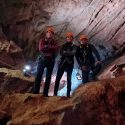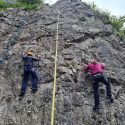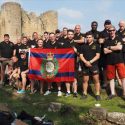In Sep 2023, 101 Engineer Regiment ran EX BLACK CHARGE 4 in Somerset, a multi-day AT package in the Cheddar Gorge area. 30 Reservists from the London, Kent and Essex regions undertook a series of land-based challenges as well as extra-curricular activities to improve their leadership skills and enhance their civilian qualifications.
The aim of the exercise was to help encourage a new generation of exercise leads. The reserves need to grow to meet national targets and our people need a wealth of new skills in a competitive marketplace. The exercise utilized 6 AT activities: cave freefalling, rock climbing, mountain-biking, caving, road cycling and hill walking. We also ran background activities in the evening which included food handling training, first aid at work and vehicle familiarization against driving licenses. These last 3 skills are vital to help with the running of unit cohesion events and for ongoing health and safety improvement.
We were based at Yoxter Cadet Camp which is only minutes away from Cheddar Gorge which is a fantastic place to deliver land-based AT and the caves are challenging for anyone apprehensive in confined spaces. As part of the initial training, the soldiers were led into one of the furthest parts of the cave system and told to remain calm in total darkness. The head torches were all switched off, and for many this was the first time they really could not see their hand in front of their face. Total darkness. All soldiers did a great job, and the espirit des corps came through when the usual fear of darkness was replaced with a sing-song. Soldiers were encouraged to navigate through tight corridors of rock formations whilst maintaining understanding of individual needs and abilities. They were also familiarized with the safety procedures in case of emergencies. The weather outside was torrential, and initially many people were nervous about the possibility of the caves flooding. We learned from the instructors that the river now runs below the caves and flood water is pushed out through this underground river to the river running alongside the road. As such the caves do not get submerged, much to the disappointment to those dive-qualified people in the group.
Sgt John Weller “I really loved caving, even though crawling on hands, knees, elbows and sometimes with your body going through a hole only just wider than you is nerve racking. All you think is ‘Don’t let it be me that gets stuck!”.
The rain created testing conditions for the hill walking event. The clouds came well below the peak line and the wind made map reading challenging. The soldiers are used to adverse conditions and were well prepared for the unpredictable UK weather. The entire walk was about 6km along ridges around Cheddar Gorge starting from the area of Jacobs Ladder, with individuals taking turns to lead the group and monitor the route for obstacles.
SSgt Ross Meehan “The group did really well under some trying circumstances. Weeks of sunshine previously and we were faced with rain and clouds and wind. But the team did brilliantly to look after each other and find routes through the terrain. And the views were worth it once the clouds shifted and the sun came back out”.
We discovered many potential rock-climbing instructors amongst the ranks during the exercise. The cliffs at the gorge provide a multitude of climbing opportunities, and even the training section is still quite challenging. Of the four training climbs, only one has man-made foot/hand holds drilled into the rock face. The second climb has man-made holds at the bottom to aid the initial climb, and the third has holds at the point where the rock face becomes slate. The fourth climb has no man-made aids and this one is a particular challenge, especially as the rock comes out at an angle and creates an overhang. One soldier, Spr Rai, is a Nepalese expedition leader to Everest, and even he found climb four a challenge. Despite this difficulty, well over half the soldiers managed all four climbs. Once at the top you could see the exhaustion on faces and the shaking of arm muscles that had been really out to the test.
Spr Liam Irving “I really enjoyed the rock climbing. I didn’t think I’d be any good because I’m not very strong. But I’m tall and that massively helped reach the rocks”
Inside the Gorge there is a caving freefall area. Where the river has carved away the rock it has left behind not only horizontal pathways, but also vertical drops. Using a series of ladders, we climbed up through these rocks to a ledge by a cavern. Suspended from the ceiling is a pulley system, and 40ft below in the dark cave, a series of crash mats. One by one we were attached to the pully and walked off the ledge into the unknown, a leap of faith. This was undoubtedly the biggest challenge for all participants. Even those who had completed a bungee jump or parachute jump in the past, were apprehensive of walking off a ledge into darkness. However, no-one hesitated. After we had completed the forward walk we then progressed onto the backward leap, the ‘hang from a bar drop’, the ‘lean forward on straps’ drop, and the ‘hang backwards from straps’ drop. The pully is a braking system, but despite this safety net, the feeling of dropping to the earth is one you do not forget.
Spr Sam Jones “First jump was terrifying. It’s only when you look up at others and see the pully working that you realize there’s nothing to worry about. But then you go up again, and it’s terrifying again”.
Maj Steph Still “I’ve done a tandem parachute jump at 15,000 ft, but somehow that was easier than the cave freefall. I think because, unlike being harnessed to a partner, the cave freefall is all on you. Once you get to the top, you’re the one who has to take the leap”.
Having completed the AT around the caves area, and really putting soldiers outside of their comfort zone, the mountain-biking and road cycling were considered relaxing past times. The routes in Somerset for mountain-biking are often extreme and really highlighted who the future instructors were. Soldiers able to manage themselves and others and navigate undulating terrain were quickly identified. Capt Loughrey, the unit road cycling captain was delighted to see so many soldiers push themselves in competitive speeds, and several have asked to join the unit road cycling team as a result.
With many of the soldiers coming from poorer areas of London, and now being impacted by the ULEZ expansion, Ex BLACK CAT CHARGE 4 was the unit’s way to give those soldiers an experience that would enthuse them and give them a new focus in their reserve career. With qualifications available they are now on the first rung of being able to deliver training to others.
We are truly grateful to The Ulysses Trust for the support they gave to our exercise. Without this the participants would not have had the opportunity to engage with so many dynamic activities and really discover what they can achieve.




